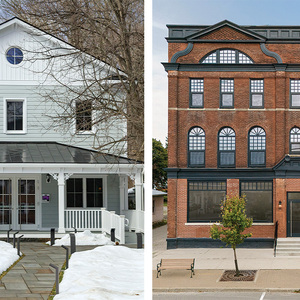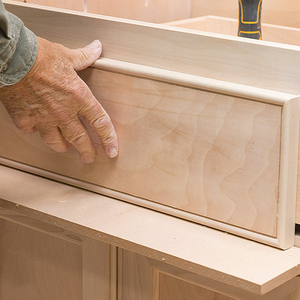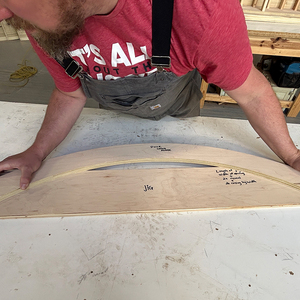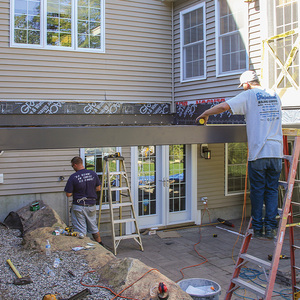First, let me apologize if this has been posted/answered. I tried using the search but couldn’t find anything.
I live in Michigan, in a 50-60 year old home with block wall construction. We got a good deal of snow, and then 4 solid rain storms. There is now water seeping up through the hairline cracks in the basement floor. I’ve had 3 contractors out (Insta-Dry, Dry Duck, and Foundation Systems of MI) to give me ideas of what to do. 2 systems, (Insta-Dry and FSM) use similar products, basically a modified “gutter system” that goes on top of the interior footing and channels water into the storm drain. Dry Duck trenches inside the basement and installs a new drain tile system that is then connected to the storm drain.
My questions:
1. Does anyone have first hand experience with any of these companies?
2. Does anyone have first hand experience with any of these systems?
3. Does anyone have other “fixes” that I could try? (I’ve heard french drains around the house, some kind of polymer coating on the inside of the basement, etc, etc.)
4. Anything I should be asking the companies?
Any and all help is much appreciated, and sorry if this is too long. I’ve heard lots of good things about B-Dry but haven’t been able to get them to set an appointment with me.



















Replies
I may be assuming the wrong thing but I want to ask if you are jumping into this from panic? What is the history of any leaks in your house? You may also ask local building department for history of rain, local building practice history (how the slab is usually installed and what kind of materials were used) and what kind of geological area you are in. If your area's water table (the average ground water) is high, the kind of snow melt and rain you mention would drive the table up and force the water through the cracks. In this case, you may be able to do nothing unless you spend a lot of money trenching and laying down drain all over the basement. Just the common sense tells me one or two courses of drain across the basement won't be the answer. By the way, is the leak from edges of the foundation or is the water leaking up from the middle of the basement?
I have no first hand experience with those companies but I did some research in the past. If the leak is from all over or the middle of the floor, the "gutter system" will not help you since those are designed to catch the leak only along the foundation. Trenching and draining sounds like what you need, but I expect the cost will be high. I would recommend asking more questions after you get some facts about average and worst rainfall records in your area, if your property is near any kind of body of water (even a little stream) and size of your basement and how landscape drains on your property. Then maybe someone in this site can give you recommended drainage. Quick way would be to pay for engineering and plan for the drainage company to follow.
Ways for you to check the company is Better business bureau, the company's liability insurance company (at least call and make sure they have insurance), your building department, neighbors, and the company's website. I expect these companies all use similar adhesive to install the gutter system (if this is what you need) but how they prepare the slab will make the difference. They will say they will grind the concrete to get the fresh surface so make sure that is what they do. Secure companies will ask for fraction of downpayment or none and don't be afraid to kick the gutter after asking. Good luck.
Thanks for the replies, let me give some more background.I have no hard surfaces touching the home (except an elevated and properly sloped porch). There are plantings all around the foundation, and all have been sloped away from the foundation. The slope drops about 12"-16" from the home in the first 5' from the foundation. All downspouts are drained well past this and not into the ground.The basement is leaking from cracks in the floor (center, left, right, corner, etc). The only place it is not leaking is from the walls and from the floor/wall joint. The leaking began 8 days ago, and at it's worst covered 90% of my basement with water. The only thing keeping the basement from fully flooding was the floor drains. As of today (no rain in 5 days) the basement is 95% dry with dehumidifier, fans, shop vac, etc. Rain is coming tomorrow.Obviously this is a "panic" reaction, but mostly because I have a basement filled with tools, and storage and NO where else to put any of it. I've checked the BBB and all 3 companies are A- to A+ (I didn't bother with the B+ and D+ companies that I found).I'm willing to try any DIY fixes I can find as long as I don't have to drop thousands to try them first. However, at the same time I work 2 jobs and have 3 little boys, so time is not something that I have a great deal of.Thanks again for the responses.
mr. mayor....
from your description this sounds like a high watertable....
also, you have FLOOR DRAINS... excellent
and , apparently, they drain to a storm drain system ??????
so... my fix would be to trench INSIDE your foundation, install stone and perfpipe and connect the pipe to the FLOOR DRAIN system
as the water table rises it will enter the pipe system and gravity flow to the floor drain system
you have to determine what all the grades ( elevations ) are of the various components to make sure everything will drain into your floor drain system
IF the grades don't work out then i would connect the same pipe system to a SUMP and pump into your floor drain systemMike Hussein Smith Rhode Island : Design / Build / Repair / Restore
Thanks for the reply Mike.I have a unified system. Sanitary and storm go out separate, but they tie into each other before hitting the city's sewer system. Doesn't make sense to me, but what do I know.This system would simply go around the inside of the footing, correct? I've read that it would also need to go across the middle of the basement. One company that has come out would install the pipe, connect to the storm line, and then add a sump as a back up. Sound like a plan?
sounds like the sump is if the storm system is submerged
but if that happens , where do they pump the sump to ?Mike Hussein Smith Rhode Island : Design / Build / Repair / Restore
It alsomost sounds like you may have a partial blockage in your existing storm drain Have you had anyone try to clean it out?
The sanitary side was cleaned out 3.5 weeks ago. Had a plumber out on Saturday for an estimate on the storm side. They wanted $300, so I'm waiting on a family friend (same one that did sanitary) to have some time to come do the storm side.
My contention is that if this is the first year this has happened, what is different?
I also have ny sanitary and storm connectd, in fact, i HAVE A PIT THAT THE WATER RUNS INTO THE house(sorry) and into a drain. I have found out I have a broken pipe and am sitting waiting for a LICENSED plumber to come and fix.
Good luck. Just talked to my guy, he's coming out tomorrow to snake it to see if that helps. Of course without a rain storm I really won't know.
tomorrow to snake it to see if that helps>>>>
I found that a snake didn't evr work all that well. You need a machine like Roto Rooter has. It has cutter on the head that cuts as it goes..
That's what I mean by snake. He sends the cutting head through to clear roots, etc. I've got him on a regular schedule for my sanitary line, guess I should have him add in the storm line too.
>>I've checked the BBB
Just remember BBB is private enterprise which makes its money from selling memberships to companies.
I believe that they don't actually check on complaints beyond whether the company has responded to the complaint
"Ask not what the world needs. Ask what makes you come alive... then go do it. Because what the world needs is people who have come alive."
Howard Thurman
Since the water's coming up through the floor it's due to high water table. Assuming that there's not, eg, a leak in the water pipe under the slab (where is your water meter and have you checked it for usage recently?), then you need some sort of system that will lower the water table. This means either cutting through the slab or excavating around the outside.
The modern conservative is engaged in one of man's oldest exercises in moral philosophy; that is, the search for a superior moral justification for selfishness. -John Kenneth Galbraith
Water meter is behaving, i.e. not running with no outlets going. Also, my water pressure is steady, so I assume a break prior to the meter would make pressure drop. Drains run fine, plumber cleared the waste line 3.5 weeks ago, and had no problems (other than roots) so the waste line shouldn't be leaking?
Had a situation at a Habitat house some years back where the water service pipe had gotten crimped and cracked near the main, about 30 feet from the house. Sump pump was running constantly, and it was being attributed to high groundwater since the house was pretty close to a creek. They were actually considering partially filling in the basement and raising the house, but then the failure of the infiltration to abate during a dry spell raised suspicions and the leak was found.
The modern conservative is engaged in one of man's oldest exercises in moral philosophy; that is, the search for a superior moral justification for selfishness. -John Kenneth Galbraith
How does one go about trying to find a leak such as this? Without digging up my yard?Edit: Also, as of this morning my basement was 95% dry (no rain in the past 5-6 days). If it was a leaking pipe I'd assume the basement would still be wet.Edited 3/17/2009 1:23 pm ET by MayorMcSmack
Edited 3/17/2009 1:23 pm ET by MayorMcSmack
Takes some detective work and kind of a "nose" for it. You could try digging post holes as deep as you can make them in several parts of the yard, and see if any area turns out to be swampier than one would expect. But unfortunately a post hole digger usually won't get you deep enough to tell for sure.
The modern conservative is engaged in one of man's oldest exercises in moral philosophy; that is, the search for a superior moral justification for selfishness. -John Kenneth Galbraith
You might want to check neighbors' yards for any signs that they have downspouts leading to "dry wells" near your property, or some such.
The modern conservative is engaged in one of man's oldest exercises in moral philosophy; that is, the search for a superior moral justification for selfishness. -John Kenneth Galbraith
How does one go about trying to find a leak such as this? Without digging up my yard>>>
Call your water supplier.
Oh, and the 3 systems that I have been shown will all cut through the interior slab. 2 place the gutter on top of the footer and then re-float the floor above it. The 3rd is a standard foundation drainage system placed under the floor.
Sometimes it could be as simple as checking the grade around your house. Is there a negative slope away from the house?
Have you checked your downspouts are extending away from the house 10+' not 1'.
Yes, the first thing to do is to walk around the outside of the house. Downspouts should have some arrangement to direct the water away from the house, and the grading of the soil around the house should direct water away. Things should be such that no water stands anywhere within about 15-20 feet of the house. Things like sidewalks, patios, and driveways that slope toward the house (or are dead flat) should be "mud jacked" to slope them properly away.
Be especially wary of downspouts that drain into underground drains. Often these lead to dry wells that simply charge the soil with water.
The only (almost) surefire way to fix a water problem such as you have is to excavate all the way around the outside of the house, down to the bottom of the footer, and install weeping tile, routed to a sump pump or drained to daylight (if slope on the lot permits that). Then the outside basement walls are waterproofed.
The various interior systems are somewhat less surefire. Most do work, to a degree, but it's hard to predict how well.
I'm in NW Ohio and the problem is likely that the ground is completely saturated, including under the slab.
Just remember a basement isn't a boat - and building a house on a boat is cost prohibitive.
It is my opinion (I do home inspections) that when the ground under the foundation is saturated, there's nothing you can do, although all of those companies will be more than happy to take your money to do it.
"Ask not what the world needs. Ask what makes you come alive... then go do it. Because what the world needs is people who have come alive."
Howard Thurman
"Just remember a basement isn't a boat "
But why can't it be? They've built boats out of concrete, so it seems like they should be able to make the darn things waterproof instead of just managing the water.
It could be, but the cost would generally be prohibitive compared to other methods that provide satisfactory results in most cases.And it's pretty much impossible to turn a foundation into a boat after the fact -- the waterproof membrane needs to be on the outside.
The modern conservative is engaged in one of man's oldest exercises in moral philosophy; that is, the search for a superior moral justification for selfishness. -John Kenneth Galbraith
>> >>"Just remember a basement isn't a boat ">>But why can't it be? They've built boats out of concrete, so it seems like they should be able to make the darn things waterproof instead of just managing the water.It can be, but the cost would be very high
"Ask not what the world needs. Ask what makes you come alive... then go do it. Because what the world needs is people who have come alive."
Howard Thurman
if it leaks,, you can always pull the boat out of the water and patch the hull
try that with a house
also, imagine if we were assuming liability for a waterproof foundation & slab
my working assumption is that all foundations will leak and the water has to be redirectedMike Hussein Smith Rhode Island : Design / Build / Repair / Restore